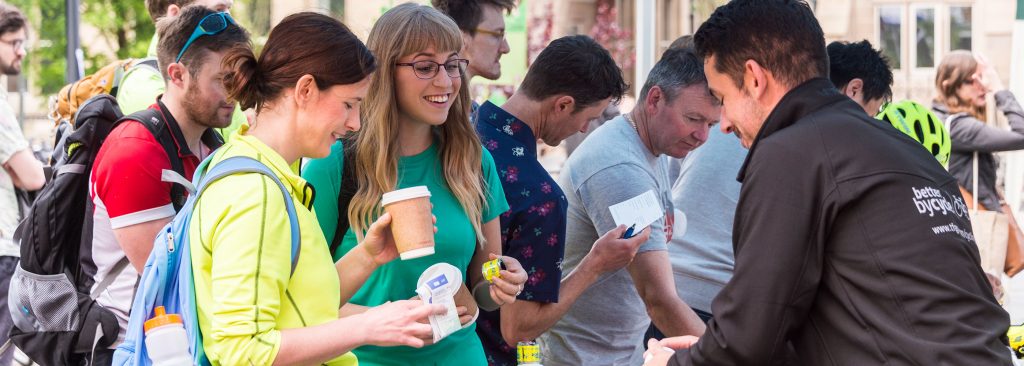Boosting healthy and sustainable travel in Manchester

The issue
In 2018, one of the largest acute trusts in the UK formed when two NHS trusts in Manchester merged to create Manchester University NHS Foundation Trust (MFT). Consequently the trust now sees over two million visitors every year and employs over 20,000 staff, many of which travel to the trust using the city’s busy roads.
This reliance by many staff and visitors on road transport has contributed to the organisation’s scope 3 carbon emissions. Scope 3 emissions are a consequence of the activities of a company but occur from sources not owned or controlled by the company such as staff travel and procurement.
The merger of the two trusts posed several challenges for the sustainable travel programme, partly due to the increased requirements for staff to travel between sites. Other challenges included changes in staff’s travel behaviours, availability of cycling facilities and public transport provision to some of the sites.
The solution
The sustainable travel programmes began in 2015, prior to the merger. The Oxford Road campus site, located on one of the busiest bus routes in Europe provided an opportunity to engage 9,000 strong workforce at the campus to take up more sustainable and active travel options.
An ambitious sustainable travel plan was launched setting targets to help reduce travel impact, focusing on areas including: increase of bus use, reduction in single-occupancy car journeys and an increase of walking and cycling, as well as other forms of active travel.
To help its staff achieve these targets, the trust made significant improvements to infrastructure including:
- over 200 additional cycle parking spaces
- two cycle hubs for staff (including storage, lockers and showers)
- an extra 11 electric vehicle charging points
- subsidised travel and discount schemes
- a Bicycle Users Group (BUG) and Electric Vehicle (EV) Users Group.
The trust also built motivation through several changes including: personal travel advice for staff, a shuttle service between sites, updated travel information, two public bus route stops on the main sites and car clubs.
Notably, the trust also hosted monthly cycle maintenance sessions and partnered with universities to host a series of monthly cyclist breakfasts to boost morale and provide support.
The impact
Staff have enthusiastically responded to these sustainable travel initiatives with over 40% now using more sustainable transport to and from work, against a 2013 baseline:
- 5,000 (25%) staff are using public transport to get to work
- 3,000 (15%) staff are using active travel (walking, running, cycling etc)
- 1,500 (5%) staff are using cycling facilities*
The trust’s annual staff travel survey results are used to make sure that this upward positive direction of travel continues.
Claire Igoe, head of environmental sustainability at Manchester University NHS Foundation Trust said: “We have made strong progress on our journey towards reducing the environmental impact of our travel activities and engaging staff in this process has been key. Alongside the introduction of infrastructure improvements, this has resulted in a marked increase in staff using sustainable and active travel methods to get to work.”
*Statistics from the Trust’s annual travel survey
Over to you!
The ongoing improvements and growing popularity of the sustainable travel programme demonstrates the positive impact these schemes can generate for local staff and broader community alike.
Similar programmes could be rolled-out with support from your local transport authority (which may be able to provide grant funding to upgrade facilities use). In addition, engaging with relevant stakeholders in your region can help to make sustainability plans on paper a reality in your local environment.
Finally, providing regular feedback opportunities using a range of channels will support ongoing improvements and help measure what’s working well and where additional work could see staff and volunteers go the extra mile for the green NHS.
For more information about this programme and what you can do to help promote sustainable travel within your local trust, please contact:
- Georgia Taylor, Sustainability Officer at Manchester University NHS Foundation: Georgia.Taylor@mft.nhs.uk
